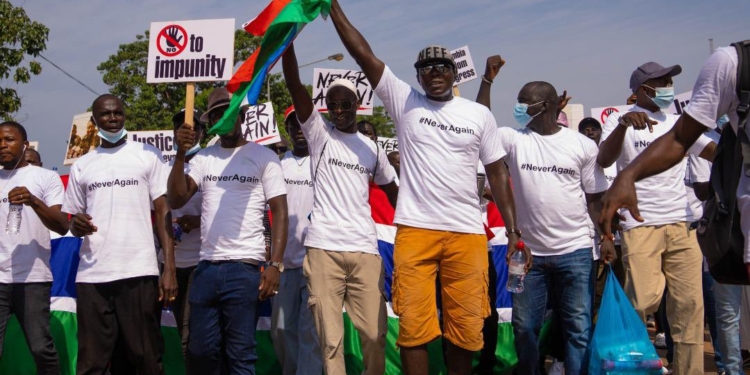Waceke Njoroge
bnjoroge@jfjustice.net
Pressure is mounting on the Gambian government to show its commitment to its earlier promise to implement the recommendations of the truth commission.
There has been disquiet among civil society organisations dealing with human rights and victims of the former regime’s violations about the government’s resolve to implement the proposals after President Adama Barrow’s National People’s Party formed a political pact with the Alliance for Patriotic Reorientation and Construction, his predecessor Yahya Jammeh’s party, as he strives to win another term during the December 4 elections.
The anxiety has been compounded by a delay in the promised release of the report of the Truth, Reconciliation and Reparations Commission (TRRC), first at the end of July, then on September 30.
The tension burst into the open during protests on October 16, 2021 as Gambians poured into the streets of the capital Banjul to demand justice and remind the government about the Never Again campaign, which has vowed to stop a repeat of human rights violations in the country.
The demonstrations prompted the government, through the Attorney General’s Chambers and Ministry of Justice, to seek to assure the citizens that it is committed to completing the process it started in 2017 and which culminated in the setting up of the TRRC.
“The ministry reiterates its continuous support for all victims of human rights violations and its commitment to the course of the TRRC and justice… The office of the Attorney-General and Minister of Justice wishes to assure all the victims, the Gambians and partners alike that the government of The Gambia remains fully committed to the implementation of the recommendations of the TRRC in the best interest of the Gambian people without fear or favour,” a statement it issued on the day of the protests said.
The ministry dismissed questions about the government’s perceived lack of commitment to implementing the awaited recommendations as “… at best premature and speculative”.
The government was at pains to show that it was serious about justice, saying it had “fully resourced” the truth commission to the tune of 200 million dalasi (approximately $3.8 million) and had given out 13 million more dalasi ($250,000) since August 2021 to facilitate the completion of the report.
Outlining, as a sign of its commitment, the measures the government had undertaken, the statement said it had in 2019 disbursed 50 million dalasi ($960,000) to the TRRC for the payment of initial reparations for victims.
“Currently, the Ministry of Justice and the Victims Centre are jointly setting up a victims-led taskforce for the drafting of legislation to set up a Victims Compensation Fund to succeed the TRRC Reparations Committee,” the ministry said, adding that the government had set aside a further 150 million dalasi ($2.9 million) in the 2022 budget estimates to go to the fund.
The ministry said the government was cooperating with the United Nations “and other multilateral and bilateral partners” to secure more funds for post-TRRC activities “including the best route to achieving justice for the victims”.
The Victims Centre and The Association of Non-Governmental Organisations organised protesters to march along Kairaba Avenue.
Although the administration of President Barrow initiated the TRRC with the aim of uncovering the extent of human rights abuses allegedly committed during the long tenure of Jammeh, there has been increasing suspicion about the government’s commitment to ensure justice and reparations for the victims by implementing the recommendations of the long-awaited TRRC report.
Civil society groups and human rights organisations have urged the commission to release its final report as a matter of urgency. Several stakeholders, including the Jammeh2Justice Ghana Coalition, have been agitating for the release of the report and the implementation of its recommendations.
The TRRC was mandated to look into violations committed during Jammeh’s regime. It heard testimony from nearly 400 people from January 2019 to May 2021. Witnesses gave testimony about cases of state-sanctioned torture, rape, and murder at the hands of security agents, particularly members of Jammeh’s death squad, the Junglers.
Nationals of several West African countries, including Ghana, Nigeria, Togo, Ivory Coast, Sierra Leone, Senegal, and Mali, also fell victim and were unlawfully killed. At the TRRC hearings, some Junglers admitted that they participated in the 2005 execution of 56 West African migrants, including 44 Ghanaians, allegedly on Jammeh’s orders.







